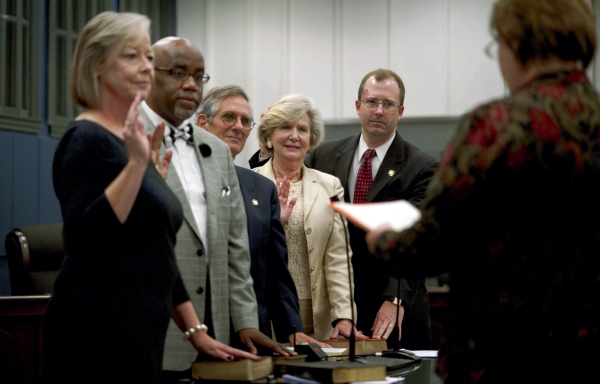Elizabeth Cook: Ken Hardin says he is no radical
Published 12:05 am Sunday, March 6, 2016

- City Clerk Myra Heard, right, administers the oath of office to Salisbury's City Council in 2015, which then included, from left, Maggie Blackwell, Kenny Hardin, David Post, Karen Alexander and Brian Miller. Jon C. Lakey/Salisbury Post
If there’s an opposite of a honeymoon period — trial by fire, perhaps — Ken Hardin has been going through it as a new member of Salisbury City Council.
He cannot be the only person feeling the stress of public service; leading the city as mayor looks like a demanding job, too. But the pressure on the only black member of City Council is distinct.
Three months into the job, Hardin says he is tired physically and tired of being told over and over that he is too angry and too radical.
Hardin insists he is neither of those things, and he spent some time at the Post on Thursday expressing his frustration at being so perceived.
The Post has published columns written by Hardin off and on since the early 1990s, but this in-depth conversation was a first. Earlier communications were nearly all email.
The man sitting across the desk from me Thursday was no revolutionary. But he has strong convictions and feels he should be heard.
Hardin brings a different perspective to the council, just as he brought a different perspective to the Post’s pages. While some black citizens avoid talking about race because they don’t want to make waves, Hardin is a wave-making machine. He considers it his duty to speak up for people who he says are too often shut out of the civic conversation.
“I don’t feel like people of color are integrated into the city,” he says, and he believes white people like it that way — as if black citizens don’t need to be heard.
Hardin says he’s not going to be silenced or censored; he doesn’t want his voice to be muted. Please don’t tell him to tone down his talk or stop bringing up race, he says.
Too many people act as though racism is something in the past and that black people need to get over, he says. “They want us to walk off racism, like it’s a sports injury.”
At the same time, Hardin acknowledges that black citizens mute their own voices, politically, by turning out in low numbers when it is time to vote. That is another of his frustrations, that so few blacks bothered to vote, yet so many keep his phone ringing day and night, asking for his help.
Hardin says he wants the black community to confront critical issues — gang activity, teen pregnancy, poverty, lagging literacy — but he cannot get traction.
“I just want people to fight for something,” he says.
Maybe people are too busy just surviving. Whatever the reason, Hardin tires of seeing the same 20 or so people show up for everything. Stalwarts are great. But Hardin, 50, says people who pushed for civil rights in the 1960s have fought long enough; it’s time for his generation and younger people to take up the mantle.
One thing editorial writers figure out quickly is this: If you are going to dish out criticism, you have to be able to take it. Thick skin is a prerequisite.
That is probably true of serving in public office too. You will have critics and people who jump to wrong conclusions, based on stereotype. As long as you’re sticking to your principles and treating people with respect, that’s OK. But if everyone has the wrong perception, you might be sending the wrong message.
Other lessons from the opinion trenches: Do more listening than talking. Consider issues from all sides. Leave room for the possibility that you might be wrong.
Be humble, if you can.
Hardin remembers his grandfather, a stern, dignified man who admonished his grandchildren to be quiet and say “yes sir” when they went with him to his place of work one day. When they got inside, Hardin was shocked to see his grandfather transform into a different person, smiling and saying “yassir” to the white people.
Be humble? His grandfather did enough of that to last for generations.
Hardin can tell he makes people uncomfortable, and he wants them to get over that. Like many of us, he is full of contradictions. He wants to be a bridge builder, but he refuses to worry about the repercussions of what he says. He wants more attention and resources for the black community, but he’s skeptical of anyone who has no emotional or physical investment there.
He wants to be treated with respect and consideration, but he doesn’t feel that from other people.
Generally, you get what you give, but that does not always hold true when you cross the color line. I’m reminded of the white woman who walked up to a tall, black man outside a North Carolina hotel one day in the 1990s and told him to get her bags out of her car.
The man was Meadowlark Lemon of Harlem Globetrotter fame. He was at the hotel to pick up his North Carolinian of the Year award.
We are blind to discrepancies in the white perspective, the wrong assumptions we make. Ken Hardin is determined to open our eyes.
If he makes wrong assumptions along the way, just tell him. He says he is learning. Aren’t we all?
Elizabeth Cook is editor of the Salisbury Post.

